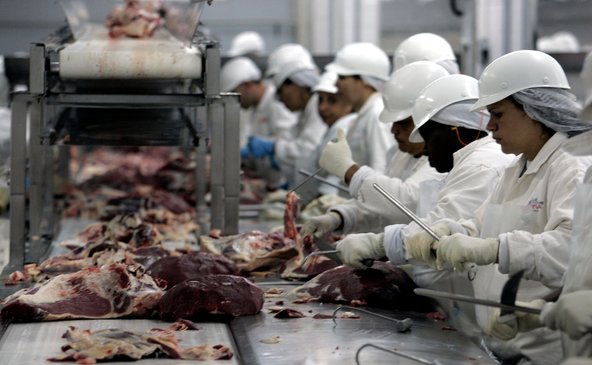This Tuesday, President Donald Trump announced that he will sign an executive order to keep meat processing plants open across the country. Utilizing the powers of the Defense Production Act (DPA), the meatpacking plants will be classified as critical infrastructure. The stated goal is to maintain the food supply which, according to the industry, is in danger of being cut off if plants close.
Since COVID-19 landed on American soil, Trump has resisted invoking his powers to compel businesses to redirect production to fight coronavirus. However, Trump has instead chosen to spring into action to use the DPA to force predominantly immigrant workers to step back into dangerous and contaminated facilities without providing necessary safety measures.
Trump previously used the DPA on April 2nd, asking several companies such as General Electric and ResMed to help in the production of ventilators. However, this order was done months into the crisis, with Trump delaying the action for as long as possible in an effort to preserve corporate profits. The order was only implemented after much outcry from citizens, far too late to save the lives of many infected. Only 1,500 ventilators are expected to come by late April, with over 10,000 to come at the end of May. But what is often left out of the narrative is that even before Trump invoked the DPA, General Electric factories had already begun the process of converting their production to ventilators due to pressures from a strike GE workers organized. GE workers demanded that their labor be used to create life-saving machines and not towards the creation of more unnecessary commodities.
While he dragged his feet to sign a DPA to convert factories into a production, Trump’s invocation of the DPA on behalf of the meat industry directly supports these corporations’ profits over workers’ welfare. The meat industry in the United States has a long and sordid history of labor exploitation and animal abuse. In 1906, American socialist Upton Sinclair wrote his muckraker classic The Jungle, describing the horrible working conditions in meatpacking facilities. Even then, the industry relied heavily on underpaid immigrants working in unsafe conditions that left many permanently injured. A hundred years later, the meat industry is still based on the horrific exploitation of labor. Since 1983, these workers’ wages have dramatically fallen by 44%, leaving most workers earning an average of $12 an hour. Workers are forced to use dangerous heavy machinery and sharp knives at incredible speeds, standing for hours and unable to leave even for bathroom breaks. There is a high rate of employee turnover at these plants due to chronic illnesses and serious injuries.
The labor force is predominantly people of color and women with almost one-third part of immigrant communities. Just last year, Trump rounded up 680 undocumented immigrants at a meat processing plant, leaving many children to come home to empty houses. Donald Trump is now forcing these workers back into dangerous work conditions — workers that, unlike healthcare professionals, won’t be called heroes. They may be “essential employees” for now, but whenever it’s convenient for Trump, many of them will be rounded up and deported while being called violent criminals.
It’s no surprise that the majority of meat processing facilities have been turned into veritable coronavirus incubators. Some 20 plants in the country have had to close down due to outbreaks of the disease. The United Food and Commercial Workers (UFCW), the union representing workers in various meatpacking plants nationwide, reports that at least 20 workers have already died from the virus and 6,500 were directly infected. In order to keep up with the capitalists’’ demand for productivity, it is impossible for workers to stand six feet apart. Even in the midst of a pandemic, they must work mere inches from each other. Many facilities refuse to give their employees proper PPE and encourage them to come in into work while sick. Workers filed complaints at the local and federal levels, but the pleas went ignored until the outbreak became so widespread that many meat processing plants were forced to close.
The greed of these companies was not the only factor that led to this massive outbreak. The Occupational Safety and Health Administration (OSHA) failed to produce guidelines for essential businesses to follow that were aligned with the guidelines set by medical professionals to protect employees against the virus. Instead, OSHA merely suggested that companies provide PPE and allow workers to stand six feet apart, not wanting to “overly burden” companies during a pandemic. Even a government department created strictly to protect the health and safety of its citizens has been co-opted by the interests of capital.
Last Sunday, the president of Tyson Foods, one of the largest companies in the industry, published a full-page appeal in the New York Times and Washington Post warning about the possible slow down of the supply chain. “We have a responsibility to feed our country. It’s as essential as health care.” However, meat isn’t essential for a healthy diet as seen by the many global communities that eat meat sparingly. A slow down in the supply chain for meat would mean that Americans would simply have to rely on other protein heavy foods such as beans and eggs. Clearly, the executives at Tyson are not speaking about the health of their own employees but the health of their own bottom line.
With a majority of processing plants closed, the supply chain of meat is in peril. The country could see up to an 80% decrease in meat production for the rest of this crisis. The closures of these plants, while catastrophic for the workers, will also have catastrophic results for the animals themselves. Livestock in factory farms lead horrific lives, forced often into dark, windowless barns and crammed into spaces so small there is little more than an inch between each animal. Due to the work stoppage in a later stage in the meat industry cycle, the factory farms have nowhere to put their livestock. The solution for these massive industrial farms has been to slaughter nearly 2 million chickens, the killing of hundreds of piglets and giving abortions to hundreds of sows, turning the piglets and fetuses into compost instead of meals for the hungry. And make no mistake, while animals are being killed for compost, there are hour-long breadlines at soup kitchens, and poor families in the U.S. are often going to be going hungry while they wait for unemployment benefits and stimulus checks that have yet to arrive.
President Trump has chosen to rush in and sign an executive order that will force the meat processing plants to continue operating and solve this production chain issue. He developed the order with the help of meat processing industry leaders, such as Tyson and Smithfield, all but ensuring that this bill will stand to create no gains for the workers that are risking their lives. He has assured the public that he’ll fix the “liability problems” of the companies involved and address the “legal roadblock” in the way of the company’s profits. These liability problems and legal roadblocks are the safety conditions of meat processing workers. His plans for procuring PPE for the workers in order to keep them safe are vague and not a determining factor for when the plants will open. The OSHA guidelines have been extended and now include more details, but they are still very much voluntary for companies to follow. The plants will open now, and the PPE will come when (and if) it comes. Trump has all but ensured that working conditions will simply remain precarious and dangerous. But, his actions have never been in service of the people, only capital.
The UFCW’s response in this crisis has been tepid at best. Union officials requested PPE for all employees and other preventative measures in early March, but none have yet to receive adequate amounts. One processing facility received beard nets in lieu of masks. A statement from union leadership summarized their negotiation tactic: “Even if 10 people get exposed in a day rather than 11. If you can implement a program where even one or two less people get exposed during a shift, that’s one or two less people.” A union leadership that is happy with the bare minimum of safety standards is ineffectual in a crisis. Many trade union leaders are completely ruling out strikes, relying instead on polite requests for life saving measures. These leaders are “eager to work with companies” instead of fighting them to force health and safety measures to be implemented. The union movement represents some nearly 15 million workers — many of whom are now “essential” — a few mass strikes would do more to protect the lives and livelihoods of millions of workers, union or non-union, employed or unemployed, than a thousand open letters.
Workers have already begun to protest this order through walkouts, in defiance of their unions mishandling their rights. On Tuesday, April 28, 50 Smithfield workers staged a walkout after the company announced its plans to reverse the plant’s shutdown and continue production with a reduced schedule. Company officials have made very slight changes, maintaining half day hours and putting up some barriers along the processing line. The minimum amount of changes is still nowhere near the CDC’s recommendation of standing 6 feet apart with masks for everyone. Employees are scared, for their lives and for the lives of their families. The walkout was another example of the wildcat strikes that are spreading across the nation. The unions representing many essential workers are still attempting to work within the parameters that the capitalists have set, attempting to create compromises instead of a full set of safety standards to protect workers. There is no way out of this crisis without affecting the profits of the big capitalists, and that can only be done by organized workers. It’s workers who should decide how and when to re-open, based on safety concerns — not capitalist profits.











